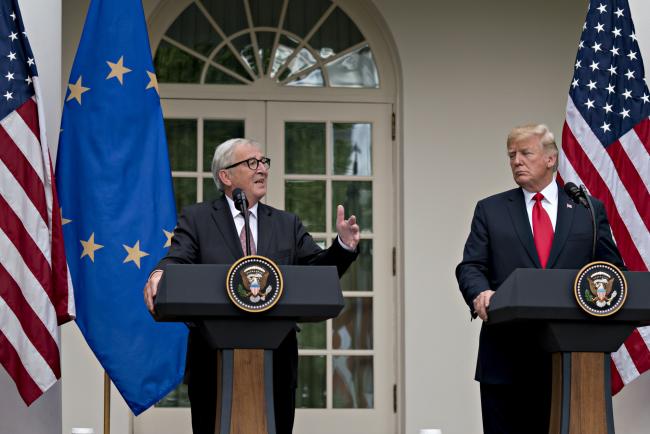(Bloomberg) -- The European Union appears to have won a big trade-war ceasefire with the U.S. for a small price -- at least in the short term.
In return for a pledge by U.S. President Donald Trump to suspend the threat of an extra tariff on European cars, the EU reheated proposals to bolster transatlantic economic ties and threw in a vow to buy more American beans.
The main question mark is the feasibility for the EU of the remaining part of the package: a goal to import more liquefied-natural gas from the U.S. This has strategic consequences for the bloc in general and for Germany in particular as Europe seeks to reduce reliance on Russian natural gas.
“We do not believe this will materialize in any significant way,” said Johana Typoltova, European gas analyst for Bloomberg New Energy Finance in London. “There is no need to build more LNG terminals in Europe. Europe’s LNG import facilities are underused as it is, especially in northwest Europe.”
In offering short-term relief and a longer-term challenge for the EU, the deal struck between Trump and European Commission President Jean-Claude Juncker on Wednesday puts the spotlight on Germany, the 28-nation bloc’s biggest economy, and may introduce strains with other nations.
French Conditions
French Finance Minister Bruno Le Maire on Thursday sought to circumscribe the European offering and signaled he expects further concessions from the U.S.
“Agriculture must remain outside the field of these discussions,” Le Maire said in a statement. “Non-tariff agricultural barriers are not negotiable. We have stringent health, food and environmental norms as well as rules of production that we are attached to.”
As Europe’s top car exporter, Germany stood to be hit hardest by any new levy imposed by Trump on imported autos based on the same national-security argument he has used to apply U.S. tariffs on foreign steel and aluminum.
“It has been possible to avert the outbreak of a trade war,” German Economy Minister Peter Altmaier said on Thursday. “The federal government feels reinforced in its attitude that tariffs must be reduced not increased.”
Germany is at the center of transatlantic tensions and internal EU differences over energy because of Berlin’s support for the Nord Stream 2 project designed to carry more Russian gas to Europe. At a North Atlantic Treaty Organization summit earlier this month, Trump said the pipeline risks making Germany “a captive of Russia.”
Gas Supplies
Standing alongside Juncker at the White House on Wednesday, Trump said the EU would become a “massive buyer” of U.S. LNG under their agreement.
Since the U.S. started exporting shale gas from the Gulf Coast in 2016, just 29 cargoes have landed in the EU. That compares with 373 tankers that have left Cheniere Energy Inc.’s Sabine Pass terminal in Louisiana alone, most of which went to higher-paying markets in Asia.
There’s nothing to indicate that will change anytime soon. Russia’s Gazprom (MCX:GAZP) PJSC, which provides more than a third of Europe’s natural gas through pipelines from vast and cheap-to-operate Siberian fields, has repeatedly said U.S. supplies will just be "drops."
Even the soybeans part of the package may involve few adjustments for the EU and minimal benefits for the U.S.
“There are no subsidies, trade taxes or quotas on soybeans in the EU,” Paul Donovan, global chief economist at UBS Wealth Management in London, said in a note. “Private farmers decide whether to buy more soybeans or not.”
Chinese Buyers
Changes in global soybean trade prompted by China’s retaliation against Trump’s tariffs may be playing the most significant role. Beijing’s recent decision to slap a 25 percent duty on U.S. soy was reshaping the global market even before the meeting between Trump and Juncker, a Luxembourger who heads the EU’s executive arm.
Facing tougher access to the Chinese market, U.S. soybean exporters have few options other than to target the EU. With Brazilian shippers set to send more cargoes to China, competition in Europe will diminish. Rabobank International Ltd. predicted in June that the U.S. may overtake Brazil as the biggest soybean exporter to the EU.
Nonetheless, European purchases aren’t likely to make up for reduced Chinese demand. China is the world’s No. 1 soybean importer and is forecast to buy more than six times the bloc’s 15.3 million metric tons in 2018-19. Last year, China bought about 33 million tons from the U.S.
Ultimately, Trump settled for a deal with the EU whose main elements he had rejected over the previous four months and whose new component featured soybeans.
With U.S. congressional elections due later this year and the American agricultural industry agitated by harm to their exports resulting from the White House’s own trade policies, some officials in Europe say they believe Trump was desperate to grab a deal he could sell to domestic farmers.
“Soybeans is a big deal,” Trump said on Wednesday.
(Updates with German economy minister comments in 9th paragraph.)
